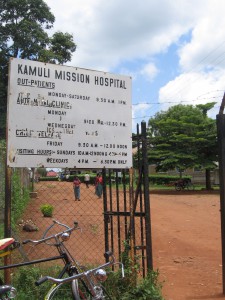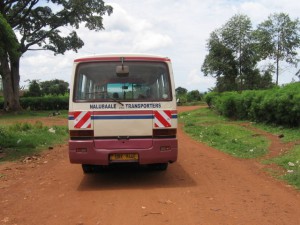Kamuli Mission Hospital, Uganda
 The morning was cool. clouds coated the sky in patches, the sun still shining through as the women emerged a few at a time from inside the health center. Some smiled shyly, extending a hand, sometimes two to clasp mine in greeting. Others extended hands without the smile. Eyes shadowed – maybe by the magnitude of the weeks ahead.
The morning was cool. clouds coated the sky in patches, the sun still shining through as the women emerged a few at a time from inside the health center. Some smiled shyly, extending a hand, sometimes two to clasp mine in greeting. Others extended hands without the smile. Eyes shadowed – maybe by the magnitude of the weeks ahead.
On the bus, I chatted with the nurse and our field office. Conversations meandered randomly managing cats and politics among other things. Our conversations finally fading, the prevailing silence of the women seated in pairs behind us, announced itself. Jewels spoke rapidly in Lusoga and a faint melody answered him. Halting. Unsure. It fell to silence.
A few moments later the melody struggled again against the silence and lost itself in the wind blowing steady through open windows. A final attempt, and success, voices mingled together sweetening the rumbling of the coaster’s tires over the dirt road.
Jewels lean forward casually, “it was too quiet, they are worried. They must make noise.”
Somehow I had missed the gravity of this ride. Didn’t give it the proper reverence. Glossed over what must have been an ominous feeling of what was coming, what to expect. Would it hurt? Would it be successful?
This wasn’t just transportation. This was transportation to possible life-changing surgery.
Easing to a stop on the side of the road, a woman clambered out of the miniature bus to use the toilet. Waiting absently for her to return, the air still, it was the first time I’d caught the lingering scent of urine that is the constant companion to women with obstetric fistula. A reminder, like their default silence, that complicated surgery lay ahead to repair the holes (fistula) that develop between either the rectum and vagina or between the bladder and vagina usually as the result of unattended obstructed labor. It is a condition mostly of the poor, highly uncommon in the western world.
These 11 women (joining others from all over Uganda) and their caretakers for the next two weeks, anticipated, feared, wondered, hoped… what surgery would be like, how life might change. for those attending the fistula repair camp for the first time, maybe it was fear of pain that left them subdued. For those on a second round of surgery, maybe the fear that they would not find success and hope, revealing itself a charlatan, would return them to their mothers’ homes, or the outskirts of villages where communities’ fears of bewitching perpetuate stigma and shame.
Twenty-three years suffering or eight months, the busload of women sharedthis long bus ride across a dirt road, the slight scent of old urine as constant companion, and the hope that glows at the end of a scalpel, stitches, and time to heal.

have you read, Cutting for Stone? You probably don’t need to as you are living it.. but I just finished it and it includes a plot line based on treating fistula in african hospitals…
interesting…i haven’t read it but maybe i’ll look for it when i’m home in january!